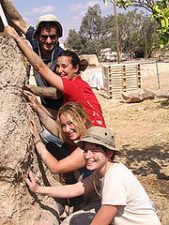 Proven bacterial technology can clean up the oil that BP’s cleaning crew leaves behind
Proven bacterial technology can clean up the oil that BP’s cleaning crew leaves behind
Prof. Eugene Rosenberg and Prof. Eliora Ron of Tel Aviv University are using naturally occurring oil-munching bacteria, grown in the lab, to clean the hard-to-reach oil pockets that occur when oil mixes with sand and organic matter on beaches and forms a thin layer on the Gulf’s precious waterways.
It’s taken millions of dollars to cap it, and it could take billions more to clean it up. BP’s oil spill in the Gulf of Mexico is acknowledged the environmental catastrophe of the century. But this new solution may help “bioremediate” the remaining problems. “It’s worked to clean up an oil spill on the coast of Haifa, Israel, so we’ve already got good evidence it could work in Florida too,” says Prof. Ron.
Using nature itself to fight contamination
The researchers identified a naturally occurring variety of sea-borne bacteria that digests oil. By studying the bacteria’s genetic background, developing methods of growing the bacteria, and increasing their capacity to ingest the oil, the scientists have developed a solution that could clean up the residual oil that can’t be removed by mechanical means.
Prof. Ron says that sucking up surface oil pools and containing the oil are important and necessary first-step actions. But her solution addresses the smaller amounts of oil left behind — that which isn’t easily removed from sand and water. It is this small percentage of oil that sits under rocks and forms a thin film on the water’s surface. Her bacterial solution can remove this oil, which is necessary to protect the sea’s wildlife.
A New York Times article explains how this works.
“We see sad pictures of birds covered in oil and people with good intentions cleaning bird wings,” says Prof. Ron. “But by the time the oil is on their wings, it’s too late. Birds die because oil gets into their lungs.”
Going the last mile
“The problem is huge and even with just a little bit in your lungs, oil is bad. Even when cleanup crews reduce the amount of oil at sea, there will probably be enough left behind to kill birds and wildlife.” At this level of oil removal, the researcher says, the only solution is bioremediation — using nature itself to do the final cleanup.
Featured in Time magazine in the 1970s, the bacterial bioremediation solution developed at Tel Aviv University has been applied to clean out the bilges of oil tankers at sea and is used around the world.
Read more on oil:
Red Sea Oil Spill Worse Than Reported
Libya Pushes To Buy Stake in BP
::AFTAU



I wonder why bioremediation isn’t being discussed more. This is really the first time I’m really hearing about it. I would love to hear more about its past applications.
I can provide a patented microbial product that degrades hydrocarbons in water and soil. This method of naturally occuring clean up has been around for decades. Unfortuneately, many companies have provided products that were not as effective as claimed. Each case is unique. I would be happy to research the effectiveness in my lab.